Boris Tadić
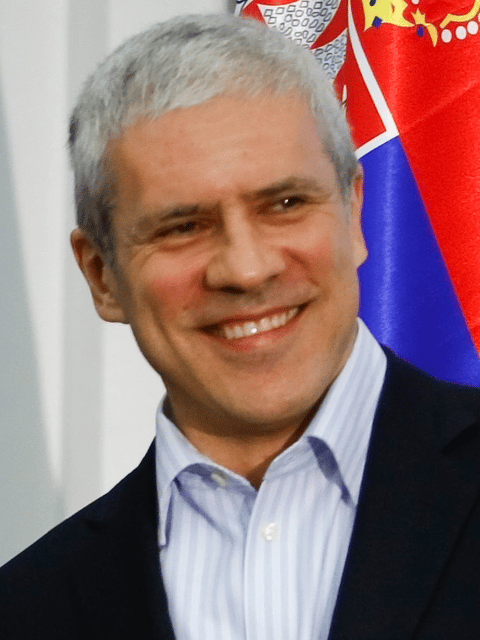
Boris Tadić

Boris Tadić | |
|---|---|
| 3rd President of Serbia | |
| In office 11 July 2004 – 5 April 2012 | |
| Prime Minister | Vojislav Koštunica Mirko Cvetković |
| Preceded by | Predrag Marković(Acting) |
| Succeeded by | Slavica Đukić Dejanović(Acting) |
| Minister of Defence (Serbia and Montenegro) | |
| In office 17 March 2003 – 16 April 2004 | |
| President | Svetozar Marović |
| Preceded by | Velimir Radojević |
| Succeeded by | Prvoslav Davinić |
| Minister of Telecommunications (Federal Republic of Yugoslavia) | |
| In office 4 November 2000 – 7 March 2003 | |
| Prime Minister | Zoran Žižić Dragiša Pešić |
| Preceded by | Ivan Marković |
| Succeeded by | Position abolished |
| Personal details | |
| Born | (1958-01-15)15 January 1958 Sarajevo, PR Bosnia and Herzegovina, FPR Yugoslavia |
| Political party | Social Democratic Party (2014–present) |
| Other political affiliations | Democratic Party (1990–2014) |
| Spouse(s) | Veselinka Zastavniković (m. 1980;div. 1996) Tatjana Rodić (m. 1997) |
| Children |
|
| Mother | Nevenka Tadić |
| Father | Ljubomir Tadić |
| Alma mater | University of Belgrade |
| Signature | |
Boris Tadić (Serbo-Croatian pronunciation: [bǒris tǎdiːt͡ɕ], Serbian Cyrillic: Борис Тадић; born 15 January 1958) is a Serbian politician who served as President of Serbia from 2004 to 2012. He was elected to his first term on 27 June 2004, when Serbia was part of Serbia and Montenegro, and re-elected for a second term on 3 February 2008, this time as president of independent Serbia. He resigned on 5 April 2012 in order to trigger an early election. Prior to his presidency, Tadić served as the last Minister of Telecommunications of the Federal Republic of Yugoslavia and as the first Minister of Defence of Serbia and Montenegro. He is a psychologist by profession.
Tadić was a member of the Democratic Party since its establishment in 1990, and its president since 2004. Following his defeat in the 2012 presidential election and poor party ratings, he stepped down in November 2012, to take the position of the party's Honorary President. After a split with the new leadership in January 2014, Tadić left the Democratic Party and formed his own New Democratic Party (later renamed Social Democratic Party) for the 2014 parliamentary election.
Tadić strongly advocates close ties with the European Union and Serbia's European integration.[1] He is widely regarded as a pro-Western leader,[2][3][4] who also favors balanced relations with Russia, the United States and the EU.[5]
Boris Tadić | |
|---|---|
| 3rd President of Serbia | |
| In office 11 July 2004 – 5 April 2012 | |
| Prime Minister | Vojislav Koštunica Mirko Cvetković |
| Preceded by | Predrag Marković(Acting) |
| Succeeded by | Slavica Đukić Dejanović(Acting) |
| Minister of Defence (Serbia and Montenegro) | |
| In office 17 March 2003 – 16 April 2004 | |
| President | Svetozar Marović |
| Preceded by | Velimir Radojević |
| Succeeded by | Prvoslav Davinić |
| Minister of Telecommunications (Federal Republic of Yugoslavia) | |
| In office 4 November 2000 – 7 March 2003 | |
| Prime Minister | Zoran Žižić Dragiša Pešić |
| Preceded by | Ivan Marković |
| Succeeded by | Position abolished |
| Personal details | |
| Born | (1958-01-15)15 January 1958 Sarajevo, PR Bosnia and Herzegovina, FPR Yugoslavia |
| Political party | Social Democratic Party (2014–present) |
| Other political affiliations | Democratic Party (1990–2014) |
| Spouse(s) | Veselinka Zastavniković (m. 1980;div. 1996) Tatjana Rodić (m. 1997) |
| Children |
|
| Mother | Nevenka Tadić |
| Father | Ljubomir Tadić |
| Alma mater | University of Belgrade |
| Signature | |
Early life
Boris Tadić was born in Sarajevo, the capital of the People's Republic of Bosnia and Herzegovina, a republic within the Federal People's Republic of Yugoslavia. His father, Ljubomir, was a philosopher and a member of the Serbian Academy of Sciences and Arts. His mother, Nevenka, is a psychologist. His maternal grandfather and up to six other relatives were killed by the Croatian Ustaše during World War II.[6]
The Tadićs are descendants of the Serb clan of Piva, in the region of Old Herzegovina, Montenegro. The family's Slava (Patron Saint) is Saint John the Baptist.[7] His parents frequently relocated between various cities and had moved to Sarajevo from Paris, where they pursued their doctoral studies, only a few days prior to his birth. Tadić and his family moved to Belgrade when he was three years old, and his father got a job at the newspaper Liberation (Oslobođenje).[8][9]
Tadić finished Pera Popović Aga (today Mika Petrović Alas)[10] elementary school and matriculated at the First Belgrade Gymnasium in Dorćol. During his teenage years he played water polo for VK Partizan, but had to quit due to injuries. He graduated from the University of Belgrade Faculty of Philosophy with a degree in psychology, specifically social psychology in the department of clinical psychology.
He worked as a journalist, military clinical psychologist and as a teacher of psychology at the First Belgrade Gymnasium.[10] Until 2003, Tadić also worked at the Faculty of Dramatic Arts at the University of Arts in Belgrade as a lecturer of political advertising.
Early political career
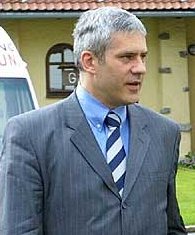
Tadić visiting George C. Marshall European Centre for Security Studies in Garmisch-Partenkirchen, 2003.
Tadić joined the newly founded Democratic Party in 1990. He served as an MP and member of the parliamentary Science and Technology Committee following the 1993 Serbian parliamentary election.
Boris Tadić founded the Centre of Modern Skills (Centar modernih veština, CMV) in 1998, an NGO dealing with political and civic education, and the development of the political culture and dialogue.[13]
The Democratic Party was part of the Democratic Opposition of Serbia (DOS), a grand coalition of anti-Milošević parties which played a key role in his downfall in 2000. Tadić was elected deputy leader of the Democratic Party twice, in February 2000 and then in October 2001.
Tadić served as Minister of Telecommunications in the Federal Republic of Yugoslavia from November 2000 to March 2003 and as Minister of Defence from March 2003 until he started his presidential campaign in April 2004. He served as an MP of the Democratic Party in the Chamber of Citizens of the Federal Assembly and later went on to be the acting parliamentary leader of the Democratic Opposition of Serbia coalition in 2003, the president of the Security Services Control Committee, as well as the parliamentary leader of the Democratic Party in the National Assembly of Serbia starting in February 2004.
The assassination of Zoran Đinđić in March 2003 led to a leadership convention of the Democratic Party in February 2004, which was won by Tadić against Zoran Živković.[14] He was later reelected unopposed in regular leadership conventions in 2006 and 2010.
Presidency
President of Serbia within state union (2004–2008)
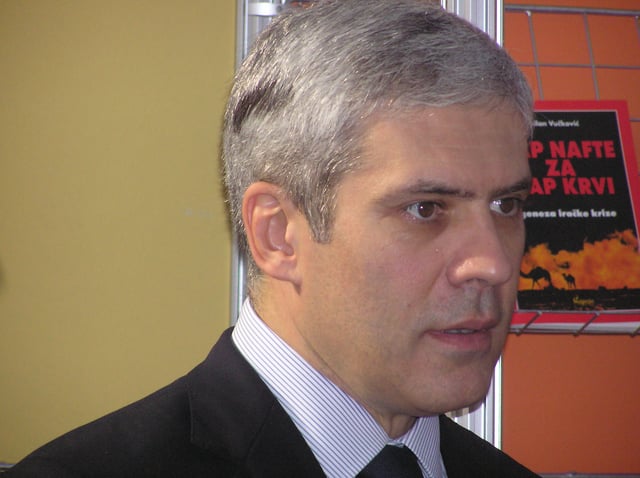
Boris Tadić at the 50th Belgrade Book Fair, 2006.
During the 2004 election campaign, Tadić promised to form a new special institution called the People's Office. The People's Office of the President of the Republic was opened on 1 October 2004. The role of the People's Office is to make communication between the citizens and the President easier, and to cooperate between other state bodies and institutions, in order to enable the citizens of Serbia to exercise their rights. The People's Office of the President is divided into four divisions: Legal Affairs Division, Social Affairs Division, Projects Division and General Affairs Division. The first Director of the People's Office was Dragan Đilas. When he joined the Government of Serbia as the Minister in charge of the National Investment Plan in 2007, Tatjana Pašić became the new Director.[17]
Tadić advocated cooperation and reconciliation of the former Yugoslav countries, strained by the burden of the Yugoslav Wars of the 1990s. On 6 December 2004, Boris Tadić made an apology in Bosnia and Herzegovina to all those who suffered crimes committed in the name of the Serbian people.[18] In July 2005, Tadić visited the Bosnian town of Srebrenica on the 10th anniversary of massacre of 8,000 Muslim men and boys by Bosnian Serb forces.[19] In 2007, Tadić issued an apology to Croatia for any crimes committed in Serbia's name during the war in Croatia.[20]
Tadić presided during the independence referendum in Montenegro (2006). He was the first foreign head of state to visit Montenegro after it became independent on 8 June, and promised to continue friendly relations. Serbia declared independence as well, and Tadić attended the first raising of the flag of Serbia at the United Nations Headquarters in New York.[21]
On 6 September 2007, Tadić was a signatory of the agreement that led to the formation of the Council for Cooperation between Serbia and Republika Srpska, together with Milorad Dodik and Vojislav Koštunica.[22] In late 2007, he stated that Serbia does not support a break-up of Bosnia and Herzegovina and that, as a guarantor of the Dayton Accords that brought peace to Bosnia, he supports its territorial integrity. Tadić also said that Serbia supports the accession of Bosnia and Herzegovina to the EU,[23] and NATO.[24]
As President, Tadić has pursued a pro-Western foreign policy. On 28 September 2005, he met with Pope Benedict XVI in Vatican City, making him the first Serbian head of state to be granted an audience with a pope. This helped improve traditionally strained Catholic-Orthodox relations.[25]
On 22 June 2007, Tadić presided over the 1000th meeting of the Council of Europe Committee of Ministers in Belgrade.[26]
Contrary to his earlier decision in the 2004 Kosovan parliamentary election, Tadić stated that he had no right to call on Kosovo Serbs to vote in the 2007 Kosovo parliamentary election, as the standards he asked for in 2004 were not reached.[27]
Reelection campaign
Boris Tadić has advocated an early presidential election that is required under constitutional law, since the adoption of the new Constitution of Serbia, after the successful constitutional referendum in October 2006. On 13 December 2007, the speaker of the Parliament, Oliver Dulić, set the election date for 20 January 2008. The Democratic Party submitted the candidacy of its leader to the Republic Electoral Commission on 21 December. The re-election campaign was led under the slogan ”For a strong and stable Serbia“ in the first round and "Let's win Europe together!" in the second. Tadić advocated integration of Serbia into the European Union but also territorial integrity of Serbia with sovereignty over Kosovo and Metohija.
Tadić received support from G17 Plus and Sanjak Democratic Party, partners from the Government. He also received support of various national minority parties including Hungarian and Romani parties. He received 1,457,030 votes (35.39 percent) in the first round. In the second round on 3 February 2008, he faced Tomislav Nikolić and won the election with 2,304,467 votes (50.31 percent).[28]
President of Serbia (2008–2012)
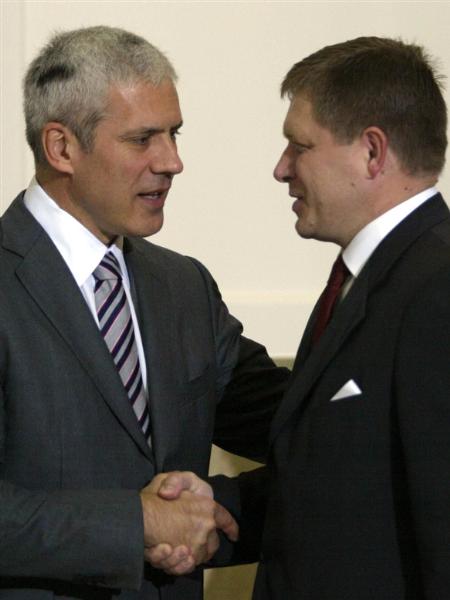
Boris Tadić with Slovak Prime Minister Robert Fico in Belgrade.
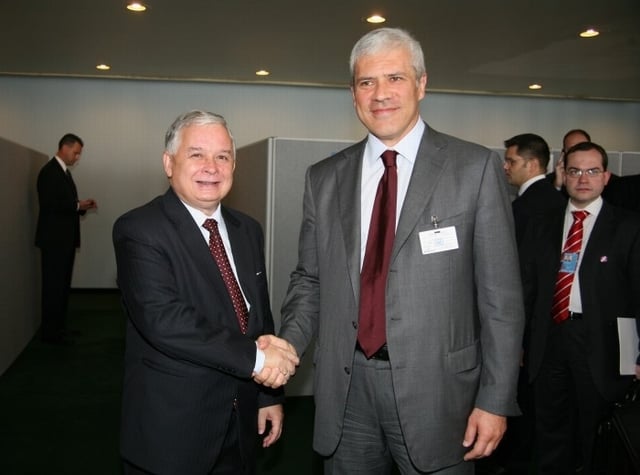
Meeting with Lech Kaczyński, late President of Poland, at the 63rd UN General Assembly session in September 2008
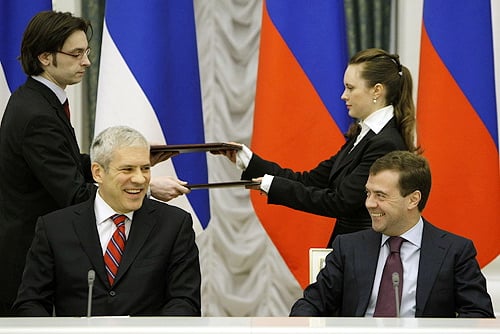
Boris Tadić and Dmitry Medvedev sealed the deal regarding the construction of a South Stream gas pipeline in December 2008

Foreign Minister of Greece Stavros Lambrinidis with Serbian President Boris Tadić and Foreign Minister of Serbia Vuk Jeremić
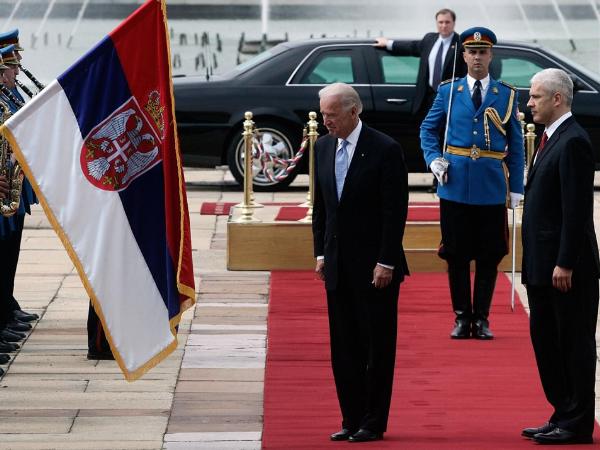
US Vice President Joe Biden meets Tadić during the state visit to Serbia in May 2009
| Presidential oath of Boris Tadić: |
| I swear that I will invest all my efforts in the preservation of sovereignty and integrity of the territory of the Republic of Serbia, including Kosovo and Metohija as its integral part, as well as the realisation of human and minority rights and freedoms, observation and defence of the Constitution and laws, preservation of peace and welfare of all Serbian citizens and that I will fulfill all my duties conscientiously and responsibly.[29] |
Tadić was sworn in at the inauguration ceremony on 15 February 2008 in the National Assembly of Serbia.[29]
The Assembly of Kosovo proclaimed a declaration of independence on 17 February 2008.[30] Boris Tadić urged a United Nations Security Council meeting to react urgently and annul the act. He also said that Belgrade would never recognise the independence of Kosovo and would never give up the struggle for its legitimate interests.[31] Russia backed Serbia's position and President Vladimir Putin said that any support for Kosovo's unilateral declaration is immoral and illegal.[32]
On 21 February Tadić met President of Romania Traian Băsescu in Bucharest where he thanked him for Romanian support and stated that "Serbia will not give up its future in Europe".
Tadić said that Serbia would never recognise an independent Kosovo.[33] He stated that the problem of Kosovo was not solved by the unilaterally declared independence and that the decade-long problems between Serbs and Albanians still exist. He called the international institutions to find a solution within the UN Security Council, for the continuation of negotiations.[34] He also called a decision made by the US President George W. Bush to send arms to Kosovo “bad news.”[35]
Tadić also said that Serbia would not accept the legality of the EU's planned policing and judiciary mission for Kosovo.[36] On 25 February 2008, Boris Tadić met with Dmitry Medvedev and Sergei Lavrov in Belgrade where Medvedev stated that “We proceed from the understanding that Serbia is a single state with its jurisdiction spanning its entire territory, and we will adhere to this principled stance in the future, We have made a deal to coordinate together our efforts in order to get out of this complicated situation”. Agreement on the South Stream pipeline was also signed during this visit.[37][38]
On 5 April 2008, Tadić called the acquittal of Ramush Haradinaj "disgraceful because of the innocent victims" and demanded the ICTY to appeal. He said that Serbia wishes to help the Tribunal to collect evidence "because Haradinaj’s place is in prison". He said that former Hague Chief Prosecutor Carla Del Ponte had said that witnesses in the case against Haradinaj had been intimidated and even murdered to prevent them testifying to his crimes.[39]
Following the Republic of Kosovo's formation of the Kosovo Security Forces in January 2009, he sent protest letters both to the and NATO Secretaries-General. The letter states that Serbia views those forces as an illegal paramilitary organisation that constitutes a threat to the country’s security and a danger to peace and stability in the Western Balkans. Tadić drew attention to the fact that the KSF were formed on the basis of the Ahtisaari Plan that was never adopted by the Security Council and added that the creation of these forces constitutes a breach of the Serbian Constitution and international law, which is why they should be disbanded. He called for the demilitarisation of Kosovo.[40]
On 13 March 2008, President Tadić signed a decree dissolving the country's parliament and slating early parliamentary elections for 11 May.[41] Boris Tadić gathered a large pro-EU coalition around his Democratic Party and G17 Plus for the Serbian parliamentary election in 2008, named “For a European Serbia – Boris Tadić”. The coalition list was led by Dragoljub Mićunović and it also included Sanjak Democratic Party, Serbian Renewal Movement and League of Social Democrats of Vojvodina.[42] The coalition won 38% of the vote, more than any other list.[43] He condemnеd remarks regarding the election made by Javier Solana and Pieter Feith and called on the European Union not to interfere with Serbian elections.[44][45]
Tadić said that he was ready, authorised as per Vienna Convention,[46] to sign the Stabilisation and Association Agreement (SAA) with the European Union if it were offered on 28 April, but not at the price of recognising Kosovo's unilaterally declared independence.[47] Tadić attended the signing of the SAA ceremony in Luxembourg on 29 April, where the Deputy Prime Minister Božidar Đelić signed the document on behalf of Serbia, as per the authorisation of the Government from December 2007. He was opposed by the then Prime Minister Vojislav Koštunica who believed that Serbia ought not to sign any agreements with the European Union.[48] While, on 1 May, Koštunica said that Russian Foreign Minister Sergei Lavrov was right when he said that the SAA should have been signed, he nonetheless vowed to annul the agreement after the parliamentary elections, calling it "not in the service of Serbia's territorial integrity."[49][50]
On 27 June 2008, Tadić named Mirko Cvetković for the new Prime Minister, following the victory of his party coalition in parliamentary election that took place in May. Cvetković was sworn in after giving the oath in the National Assembly on 7 July 2008.[51]
Following the 2008 South Ossetia War, and Russian recognition of Abkhazia and South Ossetia, Tadić refused to follow suit, saying that even though he respects the Russian support to Serbia regarding Kosovo, "Serbia is not going to recognise these so-called new countries". He stated that "Serbia is not going to do something that is against our interest, because we are defending out territorial integrity and sovereignty by using international law" and that by constitution he must defend the interests of Serbia, and not the interests of any other country in the world.[52][53]
Tadić invoked his constitutional powers of Commander-in-Chief of the Military of Serbia and dismissed the Chief of the General Staff Zdravko Ponoš on 30 December 2008. Ponoš made public accusations against the Defence Minister Dragan Šutanovac in the media. It was also revealed that he ignored the minister and has not submitted a single report in a year.[54][55]
In April 2009, Tadić announced a constitutional reform proposal. His initiative includes the proposal to reduce the number of the National Assembly members from 250 to 150 to better reflect the size of the country followed by changes in law on party registration and financing in order to consolidate similar parties and limit those with little support which should bring Serbia closer to a two-party system. The second proposed amendment would change the administrative division of Serbia by dividing it into more autonomous regions in order to achieve a more balanced development. This change would lead to Serbia's being divided into seven regions instead of the current asymmetrical division which includes two autonomous provinces but where the majority of the territory has no special autonomy.[56][57][58] However, the proposals haven't came to fruition.
During his visit to Serbia in May 2009, Lech Kaczyński, President of Poland, stated that he doesn't agree with the decision of the Polish Government to recognise the independence of Kosovo and that he as the President "favours the policy pursued by Serbian President Boris Tadić". They also discussed energy, particularly Europe's dependence on natural gas from just one source, and agreed that there is a need for a common EU energy policy that should also include the Balkan states.[59]
On 21 May 2009, Dragan Marić, a former businessman who was revolted over the court decision in his dispute with the national air carrier Jat Airways, entered the Presidency office carrying two hand grenades and seeking an out-of-court settlement signed by President or Government. Members of the Battalion of Military Police Cobras, providing security to the President of Serbia, managed to take one of the grenades immediately and isolate the attacker, however the perpetrator removed the pin from the second grenade and threatened to detonate it by releasing the lever. The negotiations were handled by the special team of the Serbian Ministry of Internal Affairs, supported by the officials of the Ministry of Justice, and lasted for several hours until the man was disarmed and arrested. After the incident, Tadić, who was present in the secured area of the building, congratulated the police and army special units, the security and negotiation team for doing a terrific job, peacefully and with no casualties and also said that problems, no matter what kind, cannot be resolved by force and by jeopardising citizens' lives.[60][61]
In October 2009, after the Serbian national team qualified for the 2010 FIFA World Cup in South Africa, Boris Tadić and other Serbian ministers celebrated at the end of the match in Belgrade's Red Star Stadium by toasting the winning team with a glass of champagne. It is illegal to consume alcohol at Serbian sporting events to stop violence. Tadić pleaded guilty, saying "I did not know that consumption of alcohol, even if only for a toast, has been forbidden so I fully take responsibility for the violation" and was fined €400.[62]
Advisors
Advisors to the President of the Republic carry out the analytical, advisory and other corresponding tasks for the needs of the President of the Republic as well as other expert tasks in relations of the President with the Government and the Parliament.[63]
| Advisor | Portfolio |
|---|---|
| Gordana Matković | General Affairs |
| Trivo Inđić | Political Issues |
| Mlađan Đorđević | Legal Issues |
| Nebojša Krstić | Public Relations |
| Vojislav Brajović | Culture |
| Jovan Ratković | EU/NATO relations |
Chief of Staff is Miodrag Rakić. Acting Secretary General of the Office of the President was Vladimir Cvijan from 2008 to 2010.
Previous advisors who served from 2005 to 2008 are Biserka Jevtimijević Drinjaković (economic issues), Vladimir Cvijan (legal issues) and Dušan T. Bataković and Leon Kojen (political issues). Most of the former advisors are now serving as directors of public enterprises and ambassadors.
Post-presidency
2012 elections and aftermath
Amid controversy regarding the legitimacy of the third mandate and the legality of certain decisions,[66] incumbent Tadić lost the presidential elections to his opponent, Tomislav Nikolić from the Serbian Progressive Party. Nikolić has won 49.7% of the votes in the runoff vote, versus 47% for Tadić, according to data of the Serbian Center for Free Elections and Democracy.[67] The result was considered somewhat of a surprise, as Tadić had exploited his resignation for the presidential vote to coincide with parliamentary elections.
Tadić was criticized both inside and outside the party for the manoeuvre of calling early presidential elections without a clear goal, and entering them with over-confidence.[68] Dragan Đilas, long-time mayor of Belgrade and one of rare Democrats who remained in his seat after 2012 elections, announced that he would challenge Tadić in December party elections. After a period of gauging the odds, it became obvious that Đilas would receive majority support. Before the electoral conference, Đilas and Tadić reached a face-saving agreement whereby Tadić would step down from the race and remain the party's honorary president, and Đilas thus became the only major candidate.[69] Đilas was elected president of the Democratic Party on 25 November 2012.[70]
New Democratic Party
In early 2014, after losing the internal reelections in the Democratic Party to Dragan Đilas[71] Tadić resigned from his position of honorary president and left the party.[72] Subsequently, a number of prominent party members all across defected from the party and stated that they intend to form a list in the forthcoming parliamentary election with Tadić as its leader. So far, coalition has been agreed with the League of Social Democrats of Vojvodina. A political party, most likely named New Democratic Party, is in the process of forming and registration.[73]
Controversies
Reconciliation wih the SPS
Following the 2008 election, Tadić's Democratic Party was unable to form a pro-European government with the hard-line Liberal Democratic Party. Faced with the possibility of a eurosceptic government led by the Democratic Party of Serbia, the Serbian Radical Party and the Socialist Party of Serbia, Tadić proposed a coalition with the SPS.
On 7 June 2008 at an assembly of the Main Board of the Democratic Party, Tadić compared the DS and the SPS saying that both grieved over the loss of their presidents, Đinđić and Milošević. His address was heavily criticized by members of the Liberal Democratic Party, the League of Social Democrats of Vojvodina and the Social Democratic Union.[76][75]
On 18 October 2008 Tadić and Ivica Dačić, President of the Socialist Party of Serbia, signed a Declaration of Political Reconciliation drafted in July,[77] agreeing on further EU integration and negotiations with Kosovo based on UN Resolution 1244.[78] The Declaration was again viewed as exonerating Milošević's regime and the G17 Plus, the Serbian Renewal Movement and League of Social Democrats of Vojvodina refused to sign it despite supporting the government.[79][80] It was also criticized by the right-wing Dveri and the Serbian Radical Party who called the declaration a reconciliation of the two wings of the League of Communists who split at the 8th Session.[81][82]
Tadić defended the reconciliation on the Nedjeljom u 2 show after the 2012 presidential election reiterating that Serbia was in need of consensus-building policies.[83]
Media bias and censorship
On 24 March 2008 the daily Politika published an article alleging that the assets of Democratic Party member and Mayor of Belgrade Nenad Bogdanović, who had died in September 2007, were being hidden in the legal case regarding his inheritance.[84] On 28 March 2008, Tadić wrote to Politika warning the newspaper that they were to alert the proper authorities, and that the article could otherwise be considered an "attempt to undermine the reputation of the deceased Mayor and put his family in danger".[85] Editor-in-chief of Politika Ljiljana Smajlović responded with a letter the same day saying that the newspaper was not the first to publish this information, and was fulfilling its obligation to keep its readers informed. She called Tadić's letter an "attempt by the government to interfere with *Politika'*s editorial policy", and that she hoped Politika's journalists "wouldn't be frightened by an intervention from the top of government and political power".[86] Tadić denied this the following day, at the initial conference of the For a European Serbia coalition.[87]
On 2 April 2008, Smajlović wrote that Chair of the Democratic Party's Executive Committee Marko Đurišić insulted two of Politika's journalists Biljana Baković and Miroslava Derikonjić, claiming that they were "propagandists and not journalists", and "payrolled by Aleksandar Nikitović", Chief of Staff of Vojislav Koštunica. She claimed that the conflict between the Democratic Party and Politika really started on 11 April when Nebojša Krstić, Tadić's public relations advisor, announced he was cancelling his column "Pogled sa Andrićevog venca" (A View from Andrićev Venac) claiming that nationalist columnists Đorđe Vukadinović and Slobodan Antonić were writing "wanted lists which put his family in danger", a claim Smajlović denied.[88] In an interview for Politika on 13 April 2008, Tadić got into a verbal confrontation with the interviewer, during which Krstić repeatedly intervened with his own remarks. The interviewer, Vladimir Radomirović, accused Tadić of asking Politika to reveal its sources, saying this was requested before, in 2002 by Chief of Zoran Đinđić's Media Bureau Vladimir Beba Popović. Tadić revealed Politika was spreading rumors first unearthed by the tabloid Kurir, and said that "there are also rumors that Politika is the mouthpiece of the DSS, but I don't want to believe that".[89]
In July 2008, the Board of Directors of Politika a.d. was changed, and Smajlović speculated in an interview for the daily Danas that her dismissal was in preparation, which Marko Đurišić denied.[90] On 1 October 2008, Smajlović was dismissed and the Director of Politika a.d. Srđan Janićijević resigned.[91] On 6 October 2008, in an interview for the weekly Standard, Smajlović claimed that her dismissal was instigated not by the German minority owner, but by Boris Tadić personally. She reiterated that her policy was to strike a balance and house many opposing columnists, and not to position Politika as exclusively critical towards Tadić.[92]
From August until September 2009, the web portal E-novine asked its readers for donations, as it was running into financial trouble and was about to be closed. The editor-in-chief Petar Luković claimed that its trouble finding sponsors interested in advertising in E-novine was due to its criticism of Boris Tadić at a time when more than 90% of the market was being held by marketing agencies under the control of Tadić's close associates Srđan Šaper and Dragan Đilas, and that the same strategy led to the closure of the Croatian weekly Feral Tribune, some of whose former staff wrote at E-novine.[93][94] The portal reiterated its allegations in January 2010 calling it a form of "sophisticated censorship". It received support from the Independent Journalists' Association of Vojvodina.[95]
On 14 September 2009, the B92 channel cancelled the 7-minute satirical segment Retrovizor starring journalist Ljubomir Živkov. E-novine published an article alleging it was due to an episode highly critical of Tadić and his intimacy with the nationalist Prime Minister of Republika Srpska Milorad Dodik aired on 13 September.[96] The channel responded claiming it was cutting costs, and that Živkov accepted that the decision was not due to political pressure, which Živkov denied in a statement published the following day.[97][98]
On 8 April 2011 the European Federation of Journalists wrote to Tadić that press freedom in Serbia was seriously compromised, that the safety of investigative journalists in Loznica and Belgrade was threatened and that independent newspapers were struggling against economic pressure and political interference, sometimes even against undue judiciary pressure through court decisions.[99] The two main journalism associations and the journalists' union stated support for the letter.[100]
In September 2011 the Anti-Corruption Council, led by Verica Barać and with the support of Commissioner for Information of Public Importance Rodoljub Šabić, Ombudsman Saša Janković, and presidents of the two main journalism associations Ljiljana Smajlović and Vukašin Obradović, published a report detailing the state of the freedom of the press in Serbia from January 2008 to June 2010. The Council concluded that the media in Serbia was overwhelmed by strong political pressure, that full control over the media was established, that no medium broadcast objective and complete information, and that events were censored or reported on selectively and incompletely. It concluded that the three main challenges for media freedom were the transparency of media ownership, the economic impact of state institutions on the media through various types of budgetary donations, and the fact that the public broadcaster RTS was severely biased towards ruling elites and political parties, resulting in the censorship of corruption allegations and numerous other problems. The report concluded that marketing agencies owned by senior Democratic Party officials and Tadić's close associates, namely Šaper and Đilas, held a significant share of the advertising market.[101]
Following Tadić's defeat at the 2012 presidential elections, the links between his party and the media came under the close scrutiny of the BIRN. The BIRN reported that the Democratic Party effectively controlled most of the media scene in Serbia through its patronage of advertising. Namely, the weekly NIN and tabloid Blic were singled out for unfair coverage and running a smear campaign against the opposing candidate, Tomislav Nikolić.
Ivan Godarsky of the Slovak media monitoring organization MEMO 98 concluded that most media in Serbia, with the exception of the pro-Nikolić daily Pravda, reported in favour of Tadić. The organization also criticized Tadić's appearances on the talk shows Veče sa Ivanom Ivanovićem and Žene on the Prva channel during his campaign, which violated a general binding instruction of the Republic Broadcasting Agency.
Boško Jakšić, foreign editor of Politika, highlighted Tadić's links to the media during the election campaign. Nebojša Krstić, Tadić’s public relations advisor and the main accused in the article, responded with allegations that Jakšić had a drinking problem.[102]
Personal life

Tadić with his daughter and wife
Tadić's sister, Vjera, is a psychologist and currently teaches psychology in the First Belgrade Gymnasium. Besides his native language, Boris Tadić is reportedly fluent in English, French, Italian and German.[103]
He was previously married to journalist Veselinka Zastavniković from 1980 to 1996, but they divorced, having had no children.[104] They met in the 1970s.[105] Throughout their marriage they were actively involved in various socio-political activities including protests and petitions against human-rights abuses and so-called 'verbal delict' in SFR Yugoslavia in the 1980s as well as anti-Milošević protests in the 1990s.
Tadić is married to Tatjana Rodić, with whom he has two daughters.[106]
He is 6 feet 2 inches (188 cm) tall.[107]
Tadić's maternal grandfather was Strahinja Kićanović, a rich tradesman and land owner who unsuccessfully ran twice for the office of member of parliament.[108] He was killed during World War II at the Jadovno camp.[109] Although this is today a well known fact stated by Boris Tadić at several occasions, Yugoslav communist authorities falsely listed Strahinja Kićanović as being killed simultaneously both at Jadovno and Jasenovac.[110] This false claim was later even copied by institutions in Croatia and the United States.[111][112]
Honours and awards
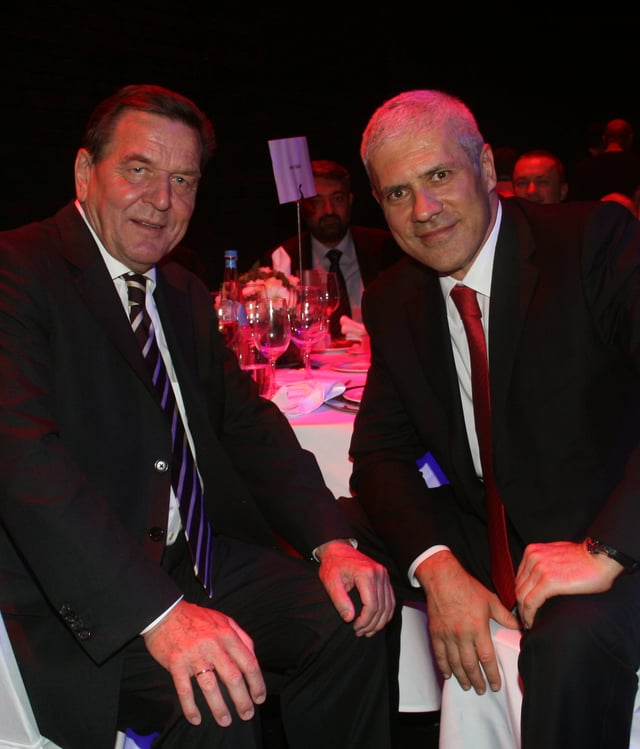
Boris Tadić attending Quadriga awards ceremony with Gerhard Schröder.
On 4 August 2007, Tadić was awarded the "European Prize for Political Culture" that is given by the Swiss Foundation Hans Ringier of the Ringier Publishing House in Locarno. Previously it was awarded to Jean-Claude Juncker. Tadić decided to donate the financial part of the award for humanitarian purposes for the maternity hospital in a town near Gračanica.[113][114]
Tadić received the Quadriga award in September 2008, an annual German award sponsored by Werkstatt Deutschland, a non-profit organisation based in Berlin. The award recognises four people or groups for their commitment to innovation, renewal, and a pioneering spirit through political, economic, and cultural activities. The other three winners were Wikipedia, represented by Jimmy Wales; Eckart Höfling, Franciscan and director; and Peter Gabriel, musician and human rights activist. The award given to Tadić was named The Courage of Perseverance and was presented by Heinz Fischer, the Federal President of Austria.[115] In March 2010, Tadić received the Steiger Award Europe of the Rhine-Ruhr for "respectfulness, openness, humanity, and tolerance".[116]
In 2011, he won the North-South Prize awarded by the Council of Europe and distinguishing his deep commitment and actions for the promotion and protection of human rights, defense of pluralist democracy and the strengthening partnership and the North-South solidarity.
In 2012, in Brussels, Boris Tadić, together with the ex-President of Croatia Ivo Josipović, has been awarded with the European Medal of Tolerance by the European Council on Tolerance and Reconciliation, in recognition of the Balkan statesmen’s “significant contribution to promoting, seeking, safeguarding or maintaining Tolerance and Reconciliation on the European continent”.[117]
European Prize for Political Culture by Ringier in 2007;
Medal For the Contribution to the Victory of Russian Federation in 2008;
The Courage of Perseverance by Quadriga in 2008;
Golden Keys of the City of Madrid in 2009;
Honorary doctorate of Dimitrie Cantemir Christian University in 2009;
40 Years of Revolution Medal of Libya in 2009;
Steiger Award of Rhine-Ruhr in 2010;
Golden Medal of Hellenic Parliament in 2010;
Jubilee Medal "65 Years of Victory in the Great Patriotic War 1941-1945" from the Russian Federation in 2010;
North–South Prize of the Council of Europe in 2011;
Order of the Republika Srpska of Republika Srpska in 2012; and
Ilyas Afandiyev International Prize of Azerbaijan in 2012.
European Medal of Tolerance by the European Council on Tolerance and Reconciliation in 2012.